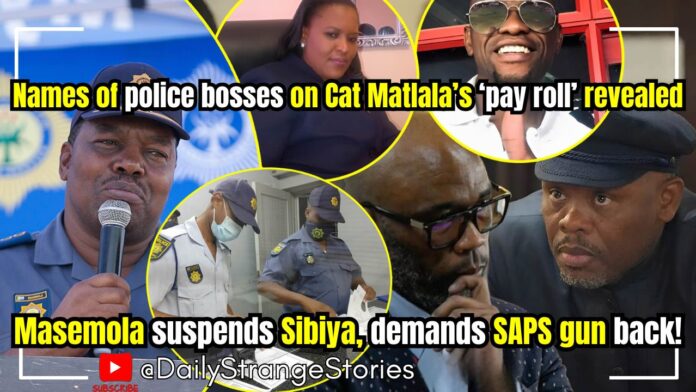Uncover the intricate web of financial dealings and influence within the South African Police Service (SAPS) in this exposé. A controversial businessman, Vusimusi "Cat" Matlala, described in court as a highly dangerous criminal, stands accused of channelling funds to senior police officials after securing a massive R360 million tender linked to former police minister Bheki Cele.
This true story delves into how Matlala's company, Medicare24 Tswane District, was awarded a contract to provide health services to approximately 180,000 police staff members across the country. The deal, approved under Bheki Cele's watch, has raised serious questions about improper payments and the blurring lines between business and law enforcement. Cele even allegedly had access to an exclusive penthouse in a Pretoria hotel following the tender's approval.
But the financial benefits didn't stop there. Bank records reveal that Matlala, through his company Luxo Africa Brand Investments, made specific payments that appear designed to benefit key figures in the police's finance and procurement sections.
We investigate payments such as the R100,000 transferred to Osizweni Meat Hyper, a butchery in Mamelodi run by Modiegi Kekana, at the request of Brigadier Rachel Matjeng from the police finance section. Another payment of R5,000 went to a dormant company called Mr Simon General Supplies, linked to Captain Brian Cartwright, who played a direct role in shaping the tender that Matlala won.
Adding to the drama, National Police Commissioner General Fannie Masemola has taken decisive action by immediately suspending controversial top cop Lieutenant General Shadrack Sibiya, following concerns raised by KwaZulu-Natal Police Commissioner Lieutenant General Nhlanhla Mkhwanazi about interference in 121 sensitive dockets related to political killings.
This documentary explores how the tender itself was cancelled by General Masemola just seven months after its award, following an internal audit that uncovered fraud, collusion, and violations of procurement rules. The audit revealed sustained under-performance by Matlala's company, irregularities in the bid documents, and misrepresentations about staff and authority. By the time of cancellation, the firm had already received R50 million in payments.
Further complicating matters, Brigadier Petunia Lenono, who headed the police's psychology services, resigned shortly before the tender was awarded and then joined Matlala as a consultant.
Now, this entire affair is under criminal investigation by the Investigating Directorate Against Corruption, which is examining the tender's award and the roles of figures like Cartwright and Matjeng.
But the story doesn't end there. This latest news reveals that even from prison, Matlala has been actively monitoring the investigators handling his case, creating a chilling environment for those involved. Prosecutors have presented evidence showing that Matlala used a concealed cellphone while in custody, attempting to dispose of it by flushing it down a toilet.
This real-time monitoring suggests Matlala has informants within the police, allowing him to track developments as they happen. The lead prosecutor has described Matlala as someone with little regard for human life, emphasizing the dangers he poses.
This atmosphere has led state witnesses to back away, choosing not to testify against Matlala out of concern for their safety. Two key witnesses, funeral parlour owner Peter Phoko and Matlala's ex-girlfriend Dora Ledile Papo, have filed complaints with the Independent Police Investigative Directorate, alleging coercion and threats by officers to sign false statements implicating him.
Amid these developments, General Masemola has escalated actions against Lieutenant General Shadrack Sibiya, upgrading a stay-at-home order to an immediate suspension over allegations of undermining investigations into political killings in KwaZulu-Natal.
This true story, as of September 15, 2025, continues to evolve, with courts and commissions set to delve deeper. It raises fundamental questions about trust in institutions and the cost of speaking out.
What do you think—should state witnesses in cases like Matlala's receive even stronger protections to encourage them to testify without fear, or do you believe the current system is enough to handle such powerful figures, and why? Share your thoughts in the comments below to join the discussion and help us understand different perspectives on making justice safer for everyone.
#CatMatlala, #BhekiCele, #FannieMasemola, #ShadrackSibiya, #NhlanhlaMkhwanazi, #SAPScorruption, #SouthAfrica, #PoliticalKillings, #PoliceTender, #InvestigativeJournalism

Follow Us on Twitter











